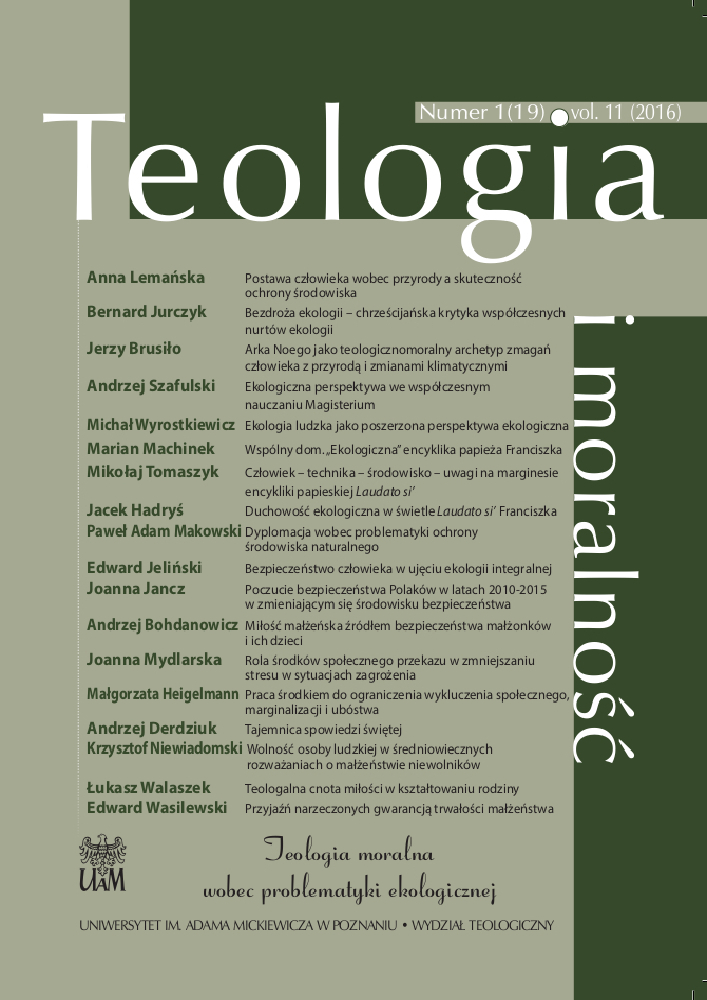Abstract
The aim of the encyclical of Pope Francis Laudato Si’ is neither settling of the controversies around the reasons of the ecological crisis, nor making concrete proposals for its solution. The Pope reveals rather the deep roots of the crisis. They are inherent in a greedy and mindless attitude to the environment. That attitude leads to a kind of “wasteful and consumerist superdevelopment”. It means that only a few profit from the resources of the earth, which have originally been destined for all. One of the keywords for understanding the encyclical is doubtlessly a term “human ecology”. According to that term not only the habitats of plants and animals should be protected but also human life and the requirements of the human nature, independently from their development stage, health and social status. The ecology is according to Pope Francis not a marginal subject of Christian reflection but it refers to the essence of Christian life founded on the Gospel itself. That is why the ecological spirituality is also very important. It enables to shape the adequate attitude to every human being and to the natural world.
References
Benedykt XVI, Encyklika Caritas in veritate o integralnym rozwoju ludzkim w miłości i prawdzie. Tekst polski w: W trosce o życie. Wybrane dokumenty Stolicy Apostolskiej, t. 2, red. J. Brusiło, Biblos, Tarnów 2012, s. 98-150.
Benedykt XVI, Jeśli chcesz krzewić pokój, strzeż dzieła stworzenia. Orędzie na Światowy Dzień Pokoju (1 I 2010), w: K. Szczygieł, W trosce o życie. Wybrane dokumenty Stolicy Apostolskiej, t. 2, Biblos, Tarnów 2012, s. 437-444.
Benedykt XVI, Przemówienie w Bundestagu, http://www.opoka.org.pl/aktualnosci/news.php?id=39463&s=opoka [dostęp: 7.06.2016].
Franciszek, Adhortacja apostolska Evangelii gaudium o głoszeniu Ewangelii w dzisiejszym świecie. Tekst polski: Wydawnictwo M, Kraków 2013.
Franciszek, Encyklika Laudato si’. W trosce o wspólny dom, tekst polski, Wydawnictwo M, Kraków 2015.
Franciszek, Medytacja podczas Mszy św. 9 lutego 2015, http://w2.vatican.va/content/francesco/it/cotidie/2015/documents/papa-francesco-cotidie_20150209_al-lavoro-con-dio.html [dostęp: 20.05.2016].
Glaeser B., Humanökologie: Der sozialwissenschaftliche Ansatz, „Naturwissenschaften” 83(1996), vol. 4, s. 145-152.
Göring-Eckardt K., Mehr als ein Weckruf, sondern Kairos, w: Papst Franciscus, Die Enzyklika Laudato si’ Die Umweltenzyklika des Papstes, Herder, Freiburg i. Breisgau 2015, s. 19-34.
Gruber F., Im Haus des Lebens. Eine Theologie der Schöpfung, Pustet, Regensburg 2001, s. 155-174.
Jan Paweł II, Encyklika Centessimus annus w setną rocznicę encykliki Rerum novarum (1991), http://www.opoka.org.pl/biblioteka/W/WP/jan_pawel_ii/encykliki/centesimus_1.html [dostęp: 18.08.2016].
Jan Paweł II, Pokój z Bogiem Stwórcą, pokój z całym stworzeniem, http://papiez.wiara.pl/doc/378717.Pokoj-z-Bogiem-Stworca-pokoj-z-calym-stworzeniem-1990 [dostęp: 25.05.2016].
Jan Paweł II, Encyklika Evangelium vitae o wartości i nienaruszalności życia ludzkiego. Tekst polski: W trosce o życie. Wybrane dokumenty Stolicy Apostolskiej, t. 1, red. K. Szczygieł, Biblos, Tarnów 1998, s. 41-134.
Jan Paweł II, Adhortacja apostolska Pastores gregis o biskupie słudze Ewangelii Jezusa Chrystusa dla nadziei świata, tekst polski, Wydawnictwo M, Kraków 2003.
Jaromi S., Koncepcja ekologii ludzkiej według Jana Pawła II, „Fides et Ratio” 10(2012), z. 2, s. 5-12.
Katechizm Kościoła katolickiego, Pallottinum, Poznań 1994.
Kehl M., Schöpfung. Warum es uns gibt, Herder, Freiburg i. Breisgau 2005, s. 16-20.
Korff W., Lexikon der Bioethik, t. 1, Gütersloher Verlagshaus, Gütersloh 2000, s.15.
Nothelle-Wildfeuer U., Die Sozialprinzipien der Katholischen Soziallehre, w: Handbuch der Katholischen Soziallehre, red. A. Rauscher, Berlin 2008, s. 143-163.
Papieska Rada Iustitia et Pax, Kompendium nauki społecznej Kościoła. Tekst polski, Wydawnictwo Jedność, Kielce 2005.
Roos L., Die Sozialenzykliken der Päpste, w: Handbuch der Katholischen Soziallehre, red. A. Rauscher, Duncker&Humblot, Berlin 2008, s. 125-142.
Römelt J., Christliche Ethik in modern er Gesellschaft. 2 Lebensbereiche, Herder, Freiburg–Basel–Wien 2009, s. 322-324.
Sobór Watykański II, Konstytucja duszpasterska o Kościele w świecie współczesnym Gaudium et spes. Tekst polski, w: Sobór Watykański II, Konstytucje. Dekrety. Deklaracje, Pallotinum, Poznań , s. 811-987.
Mariański J., Odpowiedzialność człowieka za środowisko naturalne i ekologię ludzką w świetle społecznego nauczania Kościoła, w: Fructus Spiritus est caritas. Księga Jubileuszowa ofiarowana Księdzu Profesorowi Franciszkowi Drączkowskiemu, red. M. Wysocki, Wydawnictwo KUL, Lublin 2011, s. 814.
Schockenhoff E., Anthropozentrische und ökozentrische Ethik, w: Handbuch der Katholischen Soziallehre, red. A. Rauscher, Duncker&Humblot, Berlin 2008, s. 410.
Światłość świata. Papież, Kościół i znaki czasu. Benedykt VI w rozmowie z Peterem Seewaldem, Znak, Kraków 2011, s. 61-70.
Warzeszak J., «Dyktatura» relatywizmu w ujęciu Benedykta XVI, „Warszawskie Studia Teologiczne” 24(2011), s. 291-322 .
Wyrostkiewicz M., Human Ecology. An Outline of the Concept and the Relationship between Man and Nature, Wydawnictwo KUL, Lublin 2013.
Vogt M., Das Konzept der Nachhaltigkeit, w: Handbuch der Katholischen Soziallehre, red. A. Rauscher, Duncker&Humblot, Berlin 2008, s. 411-419.
License

This work is licensed under a Creative Commons Attribution-NoDerivatives 4.0 International License.
